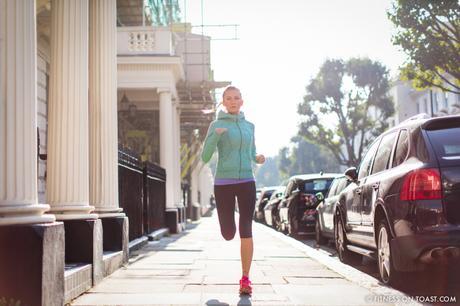
 If you’ve been following the musings of Fitness On Toast for a while, you might know that I often focus on the importance of sleep to complement a healthy lifestyle. It’s one of the key inputs that many of my Personal Training clients seem to minimise! To further my understanding of sleep, I recently took part in a fascinating research study to find out how sleep can enhance sporting performance and indeed overall fitness. Bensons for Beds, the UK’s leading bed specialists, have teamed up with The Sleep School, founded by the UK’s leading sleep expert Dr. Guy Meadows, to create a new data-driven resource, which aims to help everyone achieve a peaceful night’s sleep, in a natural way. This post reviews the test, and includes an interview with Dr. Guy, digging into the theory a little more!
If you’ve been following the musings of Fitness On Toast for a while, you might know that I often focus on the importance of sleep to complement a healthy lifestyle. It’s one of the key inputs that many of my Personal Training clients seem to minimise! To further my understanding of sleep, I recently took part in a fascinating research study to find out how sleep can enhance sporting performance and indeed overall fitness. Bensons for Beds, the UK’s leading bed specialists, have teamed up with The Sleep School, founded by the UK’s leading sleep expert Dr. Guy Meadows, to create a new data-driven resource, which aims to help everyone achieve a peaceful night’s sleep, in a natural way. This post reviews the test, and includes an interview with Dr. Guy, digging into the theory a little more! 

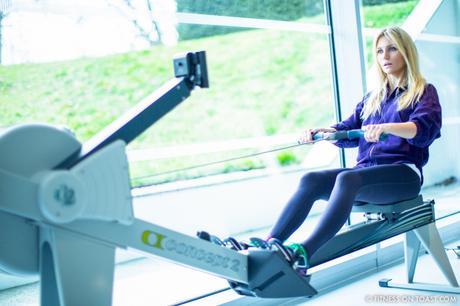


The 2 week schedule looked as follows: effectively, throughout the first week I slept for 7 hours a night and trained for 5 days of the week. At the end of Week 1, I performed a number of measurable fitness tests in a controlled environment – a 2km endurance row, a 20 minute sprint test, an ice-bucket pain-threshold test, deadlifting strength sessions, and reaction time evaluations . The results from Week 1 were then compared to the same test schedule following Week 2, during which I slept for 9 hours a night and similarly trained for 5 days straight.

THE RESULTS:
The results of my test are as follows;
Increase in reaction time (cm) in % = 41%
Increase in strength (kg) in % = 37.5%
Increase in pain threshold (sec) in % = 17%
Increase in endurance (sec) in % = 2.52%

From this data, it’s clear there is a material improvement across all the tests I carried out during week 2 (with 9 hours sleep) compared to week 1 (with 7 hours of sleep), speaking volumes about the positive effect sleep can have on our fitness performance! A vast 41% improvement in reaction time, a similarly-vast 37.5% improvement in strength, an impressive 17% improvement in pain tolerance, and a 2.52% improvement in speed! Yet before even having access to the data, my perceptions were interesting; I felt a noticeable difference in not only my mood and attitude, but also from a physical perspective. Most of us are aware that a lack of sleep can severely affect the health; however I was pretty cynical about whether two extra hours beyond the seven I’d thought to be sufficient would make a huge impact. On average (and at this stage, unquantifiably) I felt more alert for longer as the day wore on. I also felt, anecdotally, as though my gym sessions were more focussed and intense, with fatigue setting in later and in a more sudden manner. The only variable I’d changed was the two additional hours of sleep, and whether or not it had generated a misplaced belief in my mind that I’d feel better, I did feel and perform better for it, which is all that counts in the real world!
Below are my interview questions with Dr. Guy.

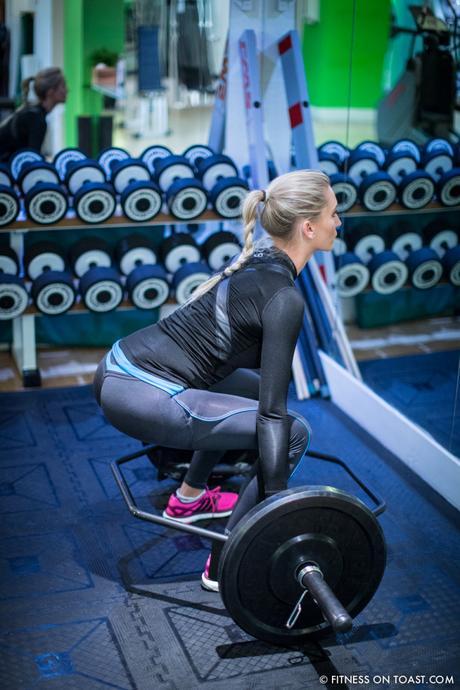

F.O.T: Why 7 vs 9 hours and not far fewer hours for example 5 vs 9 hours?
G.M: A wealth of scientific literature exists on the negative impact of sleep deprivation on sporting performance, however very little exists on the possible benefits of sleep extension. For this reason we were curious to see whether adding two hours of sleep would boost physical performance. Seven hours is also the national average and so it made sense to build up from this point.
This research was undertaken based on the findings from the Big Sleep Survey performed by Bensons for Beds and The Sleep School in January 2015. The results demonstrated that 46% of UK adults were only sleeping between 5 and 6 hours. There is clearly room for improvement!
F.O.T: Is it practical to have 9 hours sleep, and are there any adverse consequences of a sleep binge? (I sometimes feel puzzlingly tired after a long sleep)
Overall this study was interested in the impact of sleep extension on physical performance, irrespective of the number of hours. Whilst we chose to extend to 9 hours, a person could equally benefit from increasing from 6 to 7 or 8 hours. An individual’s sleep need is genetically determined. It also reduces with age. The key is to ensure that you are getting enough to be able to perform at your physical best.
F.O.T: Why did you select these particular exercises for the test?
These are standardised and repeatable tests used to assess a range of physical performance variables commonly seen in most sports e.g. strength, speed, endurance, reaction time and pain threshold.
F.O.T: You mentioned that a lack of daylight can have a huge effect on hormones and overall energy levels, which is important as we run into the dark months of winter. Can you elaborate on this please?
The rise and fall of the sun provides a powerful signal to our internal body clock helping to keep it on its 24 hour (circadian) rhythm. Without access to light the clock becomes out of sync causing the many biological processes it regulates to be disturbed including our sleep and wake levels, body temperature, hunger hormones, insulin, immune system, blood pressure and heart rate. Basically we become jet lagged and experience all of the unwelcome symptoms, but without traveling across any timelines!
F.O.T: What can people who work in environments with little or no daylight do to improve their energy levels?
Take regular breaks outside to expose themselves to natural light. Use light boxes to mimic the sun’s rays.
F.O.T: There’s a lot of conflicting information on whether it’s a good idea to have a midday nap; what’s your opinion?
Power naps lasting no more than 20 mins and always before 3pm are great. Sleeping for longer or snoozing past 3pm reduces the drive to sleep at night. The only time that sleeping for longer and later in the day can be beneficial if you are a shift worker doing nights.
F.O.T: If as humans our energy levels depend on natural daylight would that mean we need more sleep during winter and less in summer?
In the past it is highly likely that we did follow a more seasonal sleep wake cycle, however with the arrival of the electric light bulb everything changed and we started to invade the night and stay up later.
F.O.T: What’s new and cutting-edge in the world of sleep theory and research (aside from your current project!)?
The role of sleep in regulating our weight. Poor sleep disrupts levels of the hormones leptin and ghrelin causing us to feel more hungry and less full. Hence the link between poor sleep and obesity.
Poor sleep is linked to greater infection rate. People who sleep between 5-6 hours per night are four times more likely to catch the common cold than those who sleep 7-8 hours.
Small channels in the brain open up during sleep and wash out all of the neurotoxins. Sleep effectively cleans the brain!
F.O.T: What are your top 5 criteria for achieving the optimal night’s sleep, i.e. how can readers best prepare for a quality, restorative sleep?
i) Keep a regular sleep wake cycle by going to bed and getting up at roughly the same time. Regular timing strengthens the link between night time and sleep.
ii) Have a comfortable sleeping environment. You’ll spend a third of your life lying on your mattress so you want to ensure that it supports your spine in the best possible way. Discomfort at night simply fragments sleep and lowers daytime performance. Invest in a comfortable sleeping environment. You’ll spend a third of your life lying on your mattress so you want to ensure that it supports your spine in the best possible way. For maximum comfort ensure that your bed is large enough to allow movement especially if bed sharing. If you overheat or feel the cold at night then choose a mattress that regulates temperature, such as Bensons for Beds’ iGel mattress range, to help keep you cool or warm. If you suffer from chronic back pain, you need a mattress which contours to your individual body shape providing the correct spinal support. Visit Bensons for Beds and try out their unique Comfort Station Adaptive system which will help you choose the mattress type that will provide the support you need for a better night’s sleep.
iii) Get at least 30 mins of natural light exposure first thing in the morning to help sync your body clock and therefore wake you and give you lots of energy to go about your day. Very helpful for those who struggle to wake in the morning.
iv) Stay in bed and rest if you can’t sleep. You get a huge amount of benefit from lying still and resting and doing so will instruct your brain to fall back to sleep. Turning on the light or playing with your phone is not helpful.
v) Keep active everyday as this helps to reduce the time taken to fall to sleep and boost sleep quality. Avoid exercising too late though as this can elevate core body temperature and delay sleep onset.
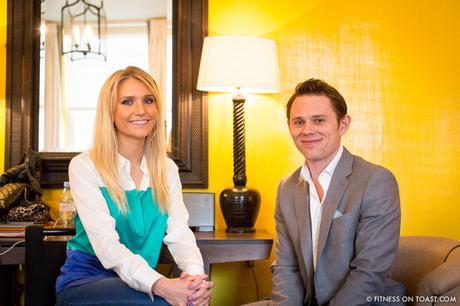
____________________
YOU MIGHT ALSO LIKE:
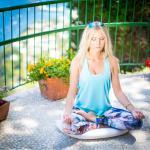
WHY TO MEDITATE!

EGGS + FOREST !

WAKE UP GLUTES!
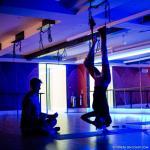
ANTI-GRAV YOGA!

